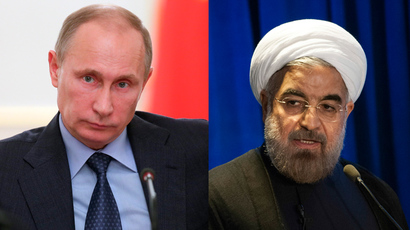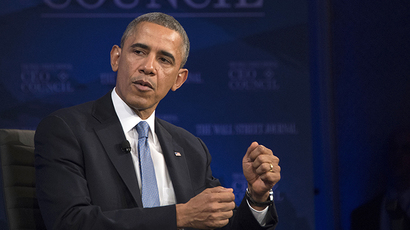US senators threaten Iran nuclear talks with call for new sanctions at ‘crucial’ stage
A group of 14 US senators announced they are calling for a new package of sanctions against Iran, just as Russia’s foreign minister arrived in Geneva for what Iran called a “crucial” phase in the talks with the P5+1 group on its nuclear program.
The talks are now focusing on the actual text of the agreement,
Iranian Foreign Minister Mohammad Javad Zarif told reporters
Friday.
“There remain just one or two unsolved questions,”
Itar-Tass quoted Zarif as saying. Those may include the
construction of the plutonium reactor in Arak, which the Iranian
official earlier called “one of the most controversial
issues.”
Zarif’s announcement came just before Russian Foreign Minister
Sergey Lavrov arrived in Geneva to take part in talks.
However, just as Lavrov was scheduled to arrive, the US senators’
call for extra sanctions on Iran appears to have added more
pressure on already tough negotiations.
“A nuclear weapons capable Iran presents a grave threat to the
national security of the United States and its allies and we are
committed to preventing Iran from acquiring this capability,”
the group said in a statement.
Among the political heavyweights pushing for new economic
sanctions against Iran are Democrats Robert Menendez, chairman of
the Senate Foreign Relations Committee and Charles Schumer as
well as Republican Senators Bob Corker and John McCain, a member
of the Foreign Relations and Senate Armed Services committees.
“We will work together to reconcile Democratic and Republican
proposals over the coming weeks and to pass bipartisan Iran
sanctions legislation as soon as possible,” the statement
read.
In the meantime Senate Majority Leader Harry Reid said that he
will go ahead with the bill on new sanctions next month if Geneva
talks fails.
“I will support a bill that would broaden the scope of our
current petroleum sanctions, place limitations on trade with
strategic sectors of the Iranian economy that support its nuclear
ambitions, as well as pursue those who divert goods to Iran,”
Reid said.
Meanwhile, legislation proposed on Thursday by Senator Bob Corker
is seeking to limit President Obama's ability to offer sanctions
relief to Iran. According to the bill Obama would have only 240
days to strike a deal and would be required to prove any relief
supports American national security interests.

Zarif and P5+1 chief negotiator Catherine Ashton earlier held a
4.5-hour-long meeting.
“It has been very detailed it has been very substantial,”
Ashton's spokesman, Michael Mann said. “We are making
progress.”
One source from the European delegation told AFP that negotiators
are “making progress” with “fewer points” of the
draft agreement remaining in “brackets.”
“But obviously the remaining issues are the hardest ones,”
the source added. “[Friday] will be important.”
Meanwhile Israel remains on the offensive to stop the
negotiations from advancing as Tel Aviv demands an immediate end
to any of Tehran’s nuclear ambitions.
At a meeting Thursday morning with Jewish leaders in Moscow,
Prime Minister Benjamin Netanyahu once again said Iran’s Supreme
Leader Ali Khamenei had shown his true face on Wednesday.
“[Khamenei] called Jews ‘rabid dogs’ and said that they were not
human,” said Netanyahu. “The public responded to him with
calls of ‘Death to America! Death to Israel!’ Doesn’t this sound
familiar to you? This is the real Iran! We are not confused!”
Iran’s Supreme leader indeed delivered a speech just before the
resumption of talks in Geneva, in which he used harsh words to
emphasize that the Islamic system is “not after a war with
others.”
“Sometimes this is heard from the enemies of Iran, such as from
the sinister mouth of the unclean rabid dog of the region in the
Zionist regime,” he said, referring to Israeli’s Prime
Minister Benjamin Netanyahu.














